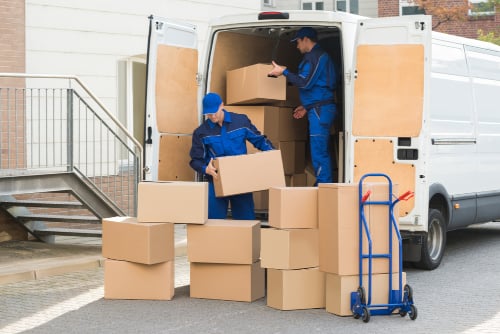
Studies have shown that moving is one of life's most stressful events. If you are a seasoned expat, you are already aware of that, and you probably also know that preparation is key to securing an enjoyable and stress-free relocation. The organisation of the moving process may feel like a dreadful task you want to procrastinate for as long as possible, but moving your belongings to England can be hassle-free with the right removal company and help from relocation experts.

Costs of moving to England
According to recent data from ECA International, a global mobility expert, England as a whole is classified as one of the most expensive countries to relocate to. So, it's fair to say that this is still the case nowadays.
Prices differ according to the country you are coming from, but in 2025, the average cost of a shipping container is £1,780 for 20 ft. and £2,997 for 40 ft. containers.
Bringing your belongings to England
Sending your belongings directly to your new home is very common. However, several carriers deliver only to a set storage point. In such a case, you must consider the additional cost of getting your belongings delivered to your home.
Make sure to seek the necessary information about transport conditions and the route. To ensure the safe relocation of your belongings, it is better to seek and compare quotes from various carriers. You can find a carrier or removal company online or at the local council.
To know whether the relocation company you have chosen is trustworthy, check whether it is part of the BAR overseas group or if they have received FIDI accreditation or a similar accolade.
To obtain an accurate quote, make sure to mention the following:
- The starting address;
- The address in England;
- The volume of goods;
- The estimated cost of goods;
- Type of transportation required.
Also, double-check if they offer an end-to-end service. Meaning, will they pack all of your belongings at the point of origin and unpack them at your destination? This includes dismantling furniture and rebuilding it.
Planning your move to England step by step
Estimating the value of your belongings
You will also be required to mention objects that require special care (such as special packaging) and the steps you will be responsible for (e.g., disassembling furniture, packing dishes).
It is good to make a comprehensive list of your belongings to establish a value statement, allowing you to claim compensation in case of damage or loss during the removal process.
You may fill out the value statement yourself and specify the overall value of your items. You should also include assets that could exceed the contractual limit value.
The removal company will offer damage insurance as part of your quote. The insurance cost may depend on the total weight of your belongings.
Signing the consignment note
Finally, you will be expected to sign the consignment note when loading and on delivery, showing your approval to the relocation company to transport your belongings.
The consignment note includes the terms of the contract, the volume transported, your name and address, the shipping company's details, and the mode of transport.
Payments are often made in two installments, the first one before loading. You will then pay the balance upon delivering your goods to the final destination in England. It is also possible to pay the total cost at once. This often depends on the relocation company you are using.
The carrier shall act on your behalf in handling all the paperwork needed, including customs clearance for moving to England. Therefore, it is recommended that you check with the British Customs Department regarding existing regulations, banned products, etc. Some prohibited goods include self-defense sprays, personal imports of meat and dairy products from most non-EU countries, and plant species.
Consider how long your container will be
Carriers from the Middle East can take between six and eight weeks to reach England, and this timeframe will be longer if you're moving from the US, South Africa, or even further.
With that said, it's important to consider what you might need with you prior to the arrival of your container. If you're moving to England with pets, you'll need to consider their bedding and everyday essentials. Moving with children? What items do they need? You'll likely need small appliances if moving with a baby from the moment you arrive in your new home.
Thankfully, there are international shipping and parcel delivery services available worldwide that can send larger suitcases and boxes ahead of you, which is especially helpful if you already have an address in England. Companies like Parcelforce, DHL, Evri and FedEx are all worth a look. It'll cost you a little extra, but at least you'll have some of your belongings shortly after your arrival while you wait for your container to be delivered.
Tips for packing your suitcase when moving to England
Sort your belongings out
Sort things out into three groups: 'Yes', 'Maybe ', and 'No'. You aim to bring the yes pile only, and half of the maybe pile if you are strong enough.
Roll your clothes up
If you wish to avoid creasing your clothes and want to fit a maximum of belongings in your suitcase, roll them up instead of folding them.
Secure fragile objects
Fragile belongings should always be in the middle of the suitcase. You can also use bubble wrap or wrap them in your clothes.
Choose the right suitcase
Buy a suitcase with several compartments. This will make it easier to separate fragile things from other belongings. Finding your belongings upon arrival will also be more straightforward.
Things to bring when moving to England
Are you concerned about what you should bring during your relocation to England? Many expats don't give this much thought before traveling.
Of course, there are not many products you can't find in England. However, packing wisely will make the first weeks of your expatriation more comfortable, so we recommend taking your time to consider your packing list for moving to England.
Before you even start thinking about what to bring to England, determine the following factors and plan accordingly:
- The time of the year for your arrival to England;
- The reason for coming to England (e.g., studies, work, etc.);
- The duration of your stay in England.
Many first-time expatriates make the mistake of packing inconsiderately while emotionally loaded, meaning they don't think practically.
If you don't want to arrive at the airport's check-in station with heavy and expensive luggage (we have all seen airlines' strict rules about overweight luggage and extra suitcases), start making a list with ‘things to take,' ‘things to store,' ‘things to donate,' and see this journey as an opportunity to clear out your wardrobes.
This is the time to let go of pieces you don't wear and organize a farewell/clothes swap party with your friends at home.
Items that you won't regret packing for a move to England include a waterproof and windproof jacket, an umbrella, rain boots, a warm hat, warm socks, mittens, and a scarf. When styling up, think of layering by wearing items on top of each other so you are prepared at any time of the day for Britain's unpredictable and continuously changing weather.
Finally, there's no need to bring your whole wardrobe. Across England, you can find shopping outlets that are home to designer brands or high street stores that hold bargain prices. Online shopping is also trendy and widely accessible in England.
What is different in England?
Electronics
England is one of the few countries with G plug sockets and does not accept any other type of international plug socket.
With that in mind, you can opt for either a UK electrical adapter or a universal adapter, which is more economical in the long run, especially if you plan to move to another country.
An electrician in your home country can also help you fit an English plug on your electrical items if you are planning to stay in England for a very long period.
Cosmetics
Expats are used to certain cosmetic brands in their home countries, but it's not guaranteed they will find the same products in England.
You can still check their availability in England before packing extra shaving cream, face cream, and hair serum in your bag. This will help you save space and money.
Moreover, there are cosmetic products you can buy only in England, which can be as good as those you're used to, if not better.
Imports
It is highly recommended that you check the import rules for your country when traveling to England.
It would be heartbreaking to pack your favorite things only to see them being seized by the Customs Department.
Useful links:
FIDI - The International Federation of International Movers
We do our best to provide accurate and up to date information. However, if you have noticed any inaccuracies in this article, please let us know in the comments section below.








